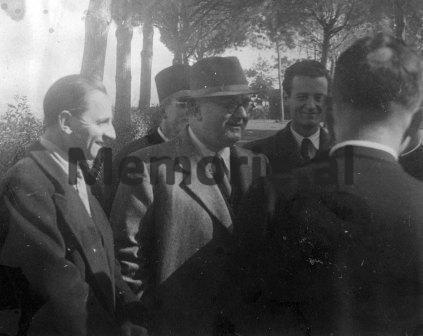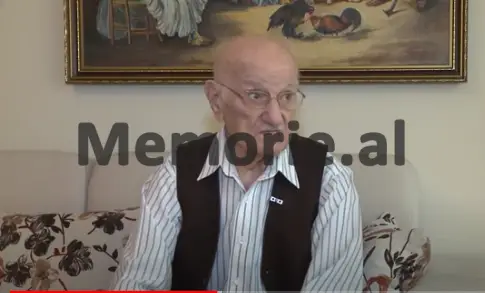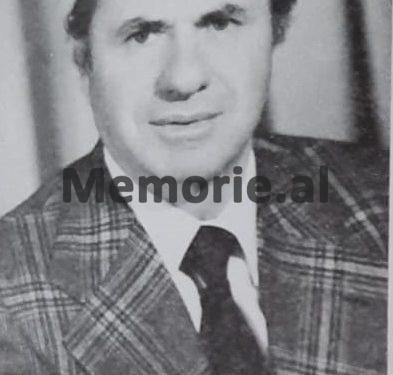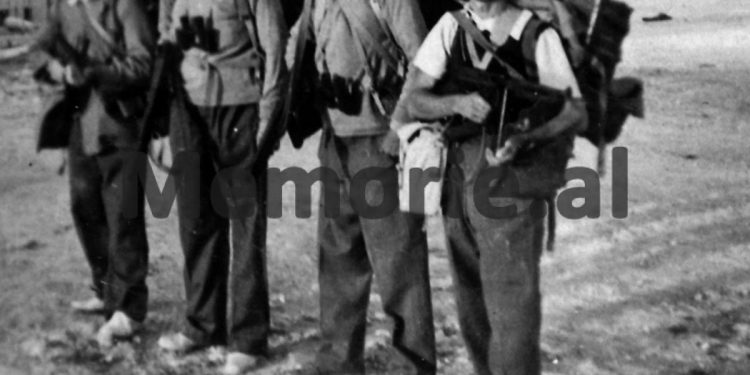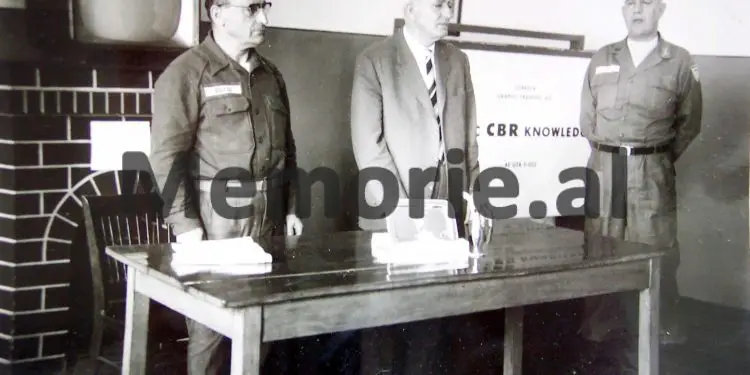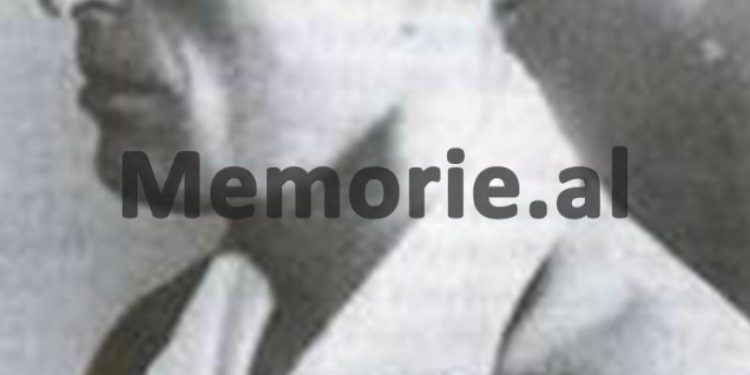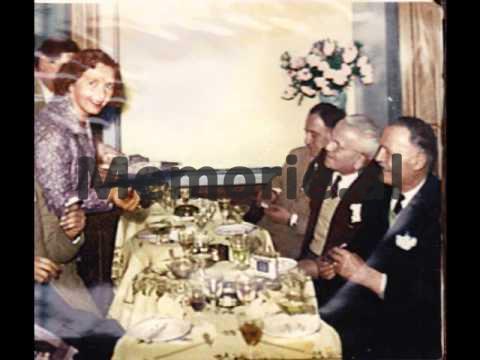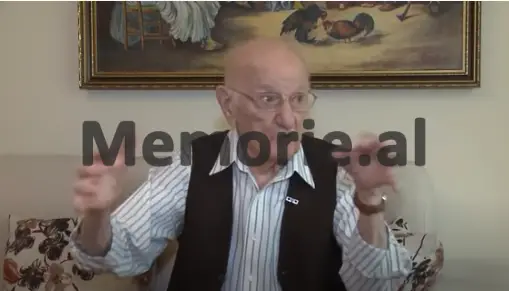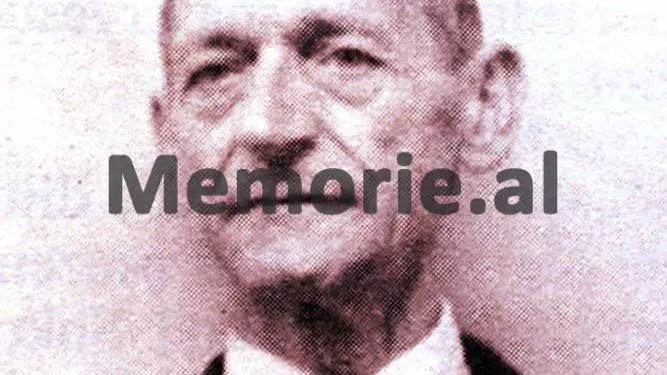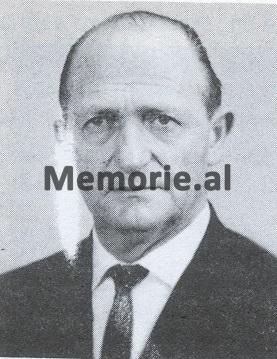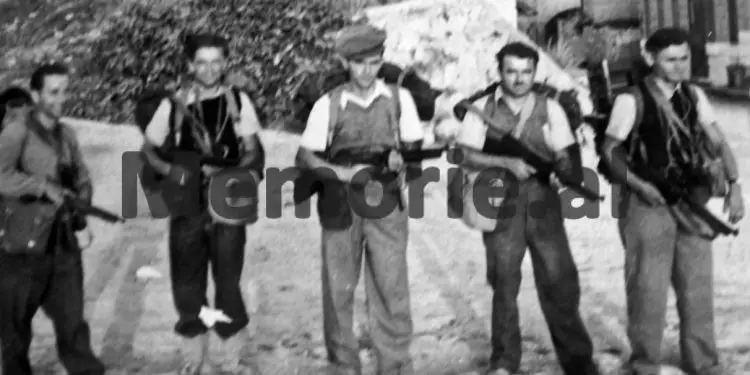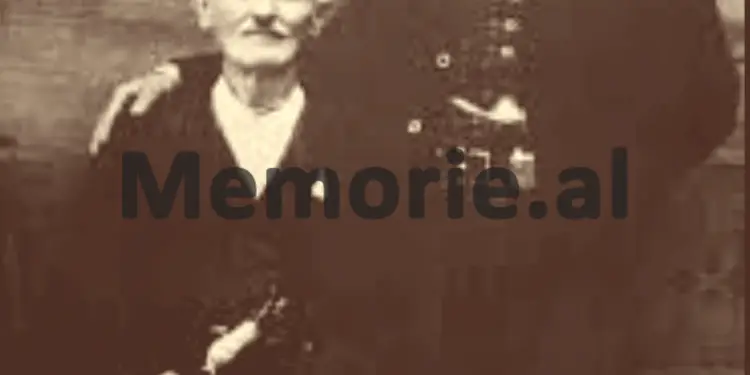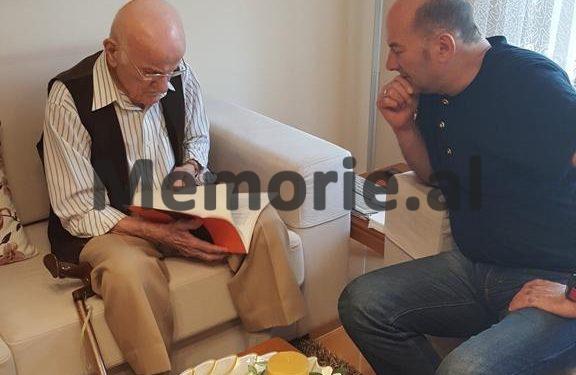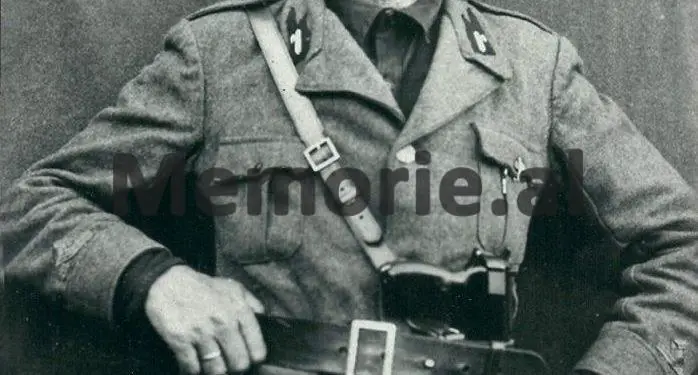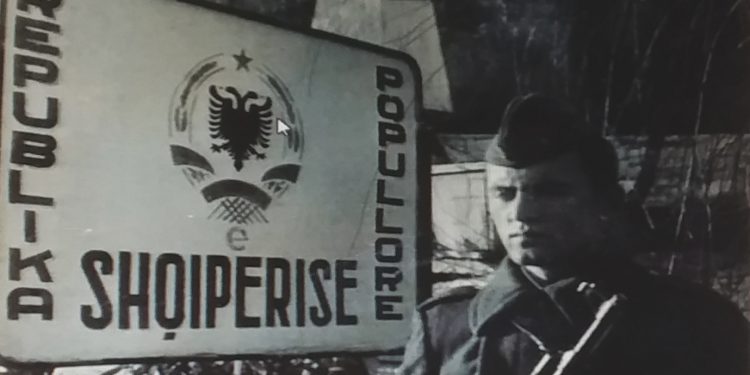Dashnor Kaloçi
Memoria.al publishes the rare and unknown story of Ndue Mëlyshi originally from Mirdita, where his father, Gjoni was a bayraktar of Kthella, while his brother, Nikolla during the period of the Bird Monarchy served as a soldier in the Royal Guard, while his son their uncle, Frroku, in the Gendarmerie weapon. How the roads were temporarily divided between the two cousins during the occupation of the country, after Frroku fought against the partisan forces in the South of Albania and at the end of the War, he joined Gjon Marka Gjoni in the city of Shkodra, taking revenge for the murder of Lieutenant Colonel Adem Boletini (son of Isa Boletini), from the communists, while Nikola became a partisan, joining the VII Assault Brigade commanded by Gjin Marku, Ramiz Alia and Adil Çarçani, fighting all the way to Visegrad, Yugoslavia. Ndue Mëlyshi’s rare testimony of how he was forced to flee in 1947 with his brother Captain Nikoll Mëlyshi, Pal Mëlyshi’s father (the main character in the movie “Operation Fire”) after the communists burned down the towers and the whole family with women and children were interned in the camps of Kruja, Berat, Tepelena, etc. How did Nduja stay in the mountains of Mirdita in the struggle with the Pursuit Forces until ’49 when he was forced to flee to Yugoslavia together with 53 members of the anti-communist resistance, after the murder of Bardhok Biba, after they shot his brother Lleshi and uncle’s son , Frrok, whose corpse was burned with kerosene to terrorize the people of that province. Ndue parachuted into Albania after being trained by the Americans in the Italian camps and wandering through the mountains of Mirdita and Puka until 1952, when he finally left Albania for Italy, Germany and the USA, where he lived until in 1992, when he first returned home to his family (living in the city of Shkodra with his daughter, Bardha Mëlyshi, never to return to the US after 2014) until he passed away on July 31, 2020 , at the age of 109 and was escorted yesterday to the last apartment.
“Bardhok Biba was sentenced to death by our organization and I am sorry that I did not have the opportunity to kill him with my own hand, as he was Stalin’s puppy and not Albanian.” After the answer given by Mark Jak Bajraktari, Major UDB arkarkiç, he did not continue the questioning process against our group of Albanians and closed it at all. This made that a few days later, in June, in the camp of Nis where we were, the UDB Major, Cedo Mihjovic came and called Ndue Pjetër Gjonmarku, Ndue Bajraktari, me (Ndue Mëlyshin), Mark Dodë Lleshjan, Marka Jak Bajraktarin and Pjetër Kol Preçin. After calling us in the office, he told us that during the period we were in camps and prisons, we had gone through difficulties, because according to him, the situation in Yugoslavia was still turbulent, but we should not be too upset, as the main thing was the fact that we were alive, because in many cases our lives were in danger. After this introduction, he went directly to the topic, telling us that he had personally intervened in our case and had talked to the Ministry of Interior, to release us from prison, on condition that we form six small groups with by three people and to enter Albania with secret missions ”. The man who speaks and testifies for Memorie.al is Ndue Mëlyshi, originally from Kthella of Mirdita, a former member of the anti-communist resistance forces, who fled Albania in 1949 and was parachuted into Albania after being trained by the Americans in the camps of Italy. Returning to Albania in 1992 after four decades of emigration, Ndue Mëlyshi, from 2014 lived in the city of Shkodra with his daughter, Bardha Mëlyshi, until he passed away on July 31, 2020, at the age of 109 and yesterday on August 1 was escorted to the last apartment. Although he carried on his shoulders more than a century and a decade of his life, even with endless deprivations and vicissitudes, spending almost half a century away from his family, wife and three daughters he left very young and found them with children, memory and memory never betrayed him until the last minutes when he passed away three days ago, (July 31, 2020) sitting in his armchair browsing the daily newspapers. Recently, Memorie.al managed to get a long interview with Mr. Ndue Mëlyshi, (recording it with video) in order to publish it on August 7, on the occasion of the sensational event of the murder of Bardhok Biba, an event that terrorized Mirdita and led to the departure of him and 53 members of the anti-communist resistance from Albania. During the conversation, his extraordinary memory as a “living folder”, sometimes came to his aid and notebooks where for years in a chronological way he has thrown pieces and moments from his troubled life, or the book “Mountain Life”, which he published several decades ago when he was in political asylum in the US. Conveying to the Mëlyshi family the condolences for the loss of their beloved man, in this article we are publishing in full the whitewashed interview we received recently (with the unstinting help of his daughter, Mrs. Bardha Mëlyshi), completing even with some of his notes.
Continued from the previous issue
Mr. Ndue, as a rule, should Pjetër Qafa have reported when he came to Yugoslavia about the situation you were in, or should you have done that as group leader?
I gave Pjetër Qafë with me a detailed report on Major Mijovi., Writing that we had remained in the Ktella area from the numerous pursuits of the communist forces and had not been able to leave for Yugoslavia together with Pjeter. Meanwhile I got in touch with Alush Lleshanaku and Gjon Gjinaj, continuing our difficult mission in organizing those small anti-communist resistance groups that had remained in Albania.
What happened next to your group and other groups that were in Albania, such as Alush Lleshanaku, etc.?
On November 14, 1950, Alush Lleshanaku and his group left for the area of Elbbasan and after a very difficult journey he arrived there without suffering any casualties. That was achieved after his group was escorted by two people I brought with me, Bibë Biba and Zef Lekëgega, who were old warriors and tested with mountain life.
How far did they take Alush Lleshanaku?
They both escorted Alushi and his group to the area of St. George of Elbasan and after leaving him where he was no longer needed, Biba and Zefi returned to me in the forest of Munella. At the time we were in that area, we went through an extremely difficult winter and the greatest difficulties were made by the numerous pursuits of the Pursuit Forces, but again we mountain people were able to resist until 1952.
How could you resist?
Here are the generous families who provided us with bread even though they were in the conditions of a brutal repression of the communists. But our bread-making was also extremely difficult because of the great poverty of those families who sheltered us.
What about the other groups where they operated?
At that time, Zef Ndreca and Gjon Shkurti and their group had settled in the Zepa Mountains in Mirdita, where they had the opportunity to be supplied with some food, while Gjon Gjinaj and I installed a radio provisionally in the center of Zef Ndreca. Together with the group of fighters who were there, we thought of creating a large group in the Great Munella Mountains. So on November 29, 1950, our group with all the radio arrived in the center of Zepa where Zef Ndreca, Marka Zefi, Ndue Zefi, Gjon Shkurti and Frrok Mëhilli were located where we became nine people in total. Our goal was to stay in touch with the Center of the Independent Bloc in Rome and at the same time work to create a second group in the Munella area.
Did you achieve this goal?
Unfortunately, on December 2, 1950, the center of Zepa was surrounded by numerous forces of the Pursuit Departments that came from four districts: Kthellë, Puka, Kukës and Peshkopi. Those communist forces consisted of more than 700 soldiers armed with all armaments up to heavy machine guns.
Were there any armed attempts between your group and the Pursuit Forces?
Not only did we struggle with them, but there was a fierce fighting that lasted from 12 noon until 6 pm. Our group, in addition to being badly surrounded on all four sides, was also in an unfavorable position. As a result of that situation, Zef Ndreca, Ndue Zefi, Gjon Shkurti and Frrok Nikolla were killed, while Gjon Gjini was seriously injured and lost the radio.
What did you do after these losses of your friends, how could you be saved?
After that, Bib Biba, Mark Zefi and Bardhok Shkurti, I took the wounded John and passing through the furnace of fire and the broken terrain, we were able to break the siege and leave.
Were there any killed or wounded by the Pursuit Forces?
By the communist pursuit forces, according to information we later received from the villagers, we had left 28 soldiers dead and as many wounded.
Apart from what the villagers were told, did you yourself see those killed by the Pursuit Forces?
Yes yes, five soldiers killed and a captain, we saw them with our own eyes during the retreat, and an officer took the weapon that was a German “Machine”.
After crossing the siege, where did you go?
After passing the siege, we sent the wounded Gjon Gjinaj to the village of Xhuxhë and we left that area ourselves to lose track. After those great losses we regrouped again in the area of Molung in Lezha and stayed in the mountains until 1952, when forced by the great losses caused by the communist forces, we finally left Albania.
Going back to your first parachuting mission in Albania, how do you remember and when did this happen?
Our first airborne mission in Albania took place on February 15, 1949, and we set off after training at the CIA secret US base in Golfo di Taranto, which was a military fortress in Monte Mesala located in the outskirts of Rome. That American base was related to the Independent National Bloc led by Gjon Marka Gjoni, Xhaferr Deva, Ismail Vërlaci, Kol Bib Mirakaj, Ernest Koliqi, Ndue Gjon Marku, Lin Shkreli etc. There were four of us: Alush Lleshanaku, Ndue Pjetër Gjonmarkaj, Haki Blloshi and me (Ndue Mëlyshi).
What preparations had you made at that military base, then, and for what were you trained?
There we had done various exercises, such as: theoretical lessons, specialization courses for the acquisition of transceiver radios, melee combat, stabbing, use of various weapons and shooting with them, crossing water and land barriers during the day and at night, descending and climbing rope to heights and steep cliffs, up to the use of a parachute, etc.
Why were you the fourth appointed to leave with the first group of parachutists in Albania?
The four of us were assigned, because in addition to the physical training, military, etc., that Alushi, Haki Blloshmi, and Ndue Pjetri had, we were assessed as more suitable for the fact that we had been on a secret mission to Albania other times ( entering from the land border) and we already had a great deal of experience in mountain life and the many hardships that had to be overcome. We had successfully fulfilled the tasks assigned to us in those first missions and so we were assigned again to succeed in this mission as well, which would also have psychological value to raise the morale of other comrades. who will come with secret missions to Albania.
What equipment and weapons were given to you in the first mission that you would parachute into Albania?
As a personal asset that each of us would have in our parachute, it was just a “Machine” (weapon) with two cartridges of ammunition. But in addition to the four parachutes we would throw, we would have four other parachutes, two with radios and two with dry food, clothing, light weapons and other ammunition, radio parts, medicine and stuff. others we needed and needed for mountain life, which were calculated for 30 days.
Where was the location of your parachute landing?
As the landing date was set on the same day we departed, ie on February 15, 1949, the place of our landing was predetermined in advance, but we would be notified only after we had boarded the plane, so that it could it was as secret as possible and there was no possibility of deconstruction. We were assigned to jump on the Mirdita Mountain Range at Vjerth Field, a site that had been selected as the safest for parachuting.
Why was February 15 chosen?
We were waiting to leave and the date February 15 was chosen depending on the weather, as that night was a clear time and it was very cold. These atmospheric conditions were considered suitable for our mission, as we would be able to orient ourselves when we landed, and also the opportunities for movement of the inhabitants of those areas or the Pursuit Forces, would be less and limited.
How do you remember the landing of your group with parachutes, in what direction was the itinerary of the plane and did you have any problems while landing?
After we got on the plane that took off at a small military airport on the outskirts of Rome, we took off and the plane after crossing the Adriatic Sea, took the direction of Milot and from there continued its route passing through Rubik, Rrëshen, Malaj, Kthellë e Epërme, and until we reached the Field of the Mill of Selita, places I knew by hand. Vjerth Field where we were predestined to land and we were ready to wait, was not followed by the pilot officer and seeing that he misdirected, I spoke to him and he signaled us to get ready to be thrown there in the Mill Field , because according to the coordinates he saw on the map, it was not very far from that of Vjerth.
How did you react after he did not respect the place where they were told you would land?
I told the pilot officer that I knew the place well, but he replied: “We know that job, you carry out your task assigned to you.”
What happened to you after you landed where he was told?
After that debate, the plane went on and came out on Wednesday, where we did not know any place nor did we know where we were. I jumped first and followed me Ndue Pjetër Gjomarku and after our parachutes were opened normally, we both fell into a pine mountain with a very steep place, where the Square (field in high mountains), which had us, was not visible at all. after saying before. However, we fell to the ground without suffering any damage.
What about Alush Lleshanaku and Haki Blloshmi?
After leaving us both in a few minutes from each other, the plane would make a turn and come back there again throwing Alushi and Haki. But he did not turn in that direction and Ndue Peter and I found it very difficult and we barely met each other after he threw us too far.
How did you two meet?
Ndue Peter and I met after more than half an hour with each other, firing into the air with the weapons we had with us, a sign we had made in words before we jumped.
When you fell to the ground and then when you joined, did you know where you were?
Not only did we not know where we were, but we barely got together, because in that place, in addition to being steep, there was over a meter and a half of snow and with a lot of effort we both came out in a high place to have opportunity to see better and orient ourselves in the sector where we had fallen. Only in the morning when the light dawned, we realized that we had fallen and were in the mountains of Kunora e Selita e Kthella, from where I was.
But why did the pilot make the mistake of jumping there and not in the designated place and how far were you from where he was destined to land?
I do not know and we never learned, whether the pilot made that mistake with or without intention and from where we were in Kunora of Selita e Kthella, it was not more than 25 km. on the airline to Vjerth Field where we had been assigned to land. But the biggest mistake was made with Alush Lleshanaku and Haki Blloshmi, which the plane had dropped on Macukulli Mountain (village of Burrel, province of Mat district) being another 25 km. others farther away from us.
What happened, why were they thrown so far away?
I do not know, the mistake that was made with me and Nduen, was repeated with them. But unlike us who were in our area where we had spent our lives before fleeing Albania, Alushi and Blloshmi were in an area completely unknown to them and they had to go through many difficulties that endangered the lives of some times. They did not know what direction to take, as they did not know the area at all and no one in the province where they had fallen. Although the whole area of Macukulli was known for its hospitality, Alushi and Blloshmi did not know where they were and only their location made them leave from there, walking through small forests and roadless roads for several days, without resting in any place, until they have seen and known the river Mati. Following its course, after several days of homelessness and no food at all, they saw the Bird Bridge over the Mat River in Milot and there they saw where they were./Memorie.al




